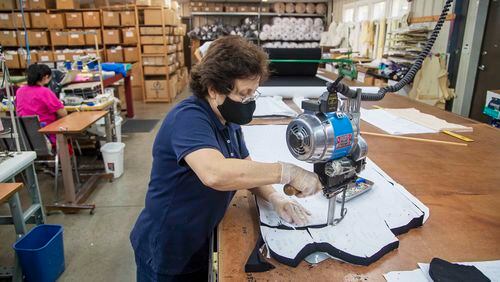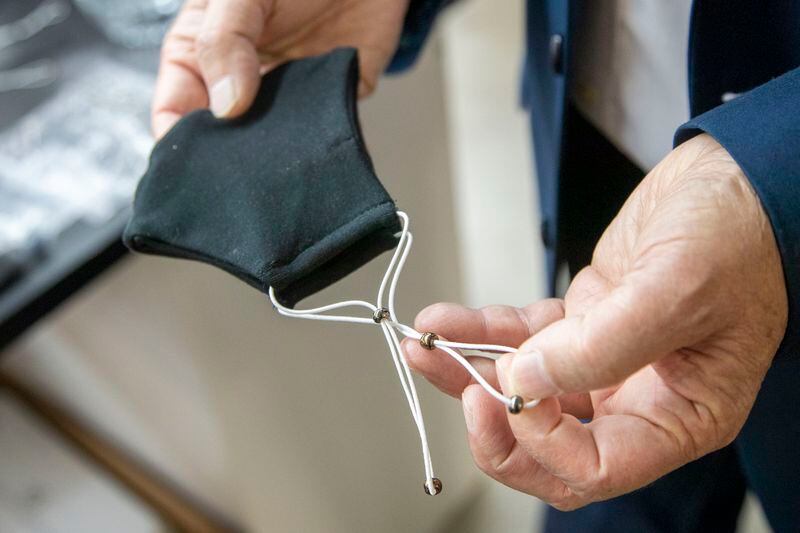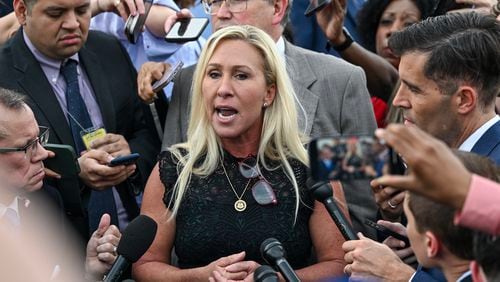Rodrigo Cano broke the awful news to employees at his family-owned Alpharetta business: The company would close temporarily as the pandemic hit Georgia.
A half hour later, workers asked him to join them in the break room. They gathered to pray for each other and the company that had employed many of them for decades.
“We have people from all kinds of religions and nationalities, and it just shook me,” the 64-year-old Cano said.
Like leaders of many Georgia businesses, he started hunting for at least a short-term solution. The pandemic itself offered an answer.
Cano’s Eurotard Dancewear, which specialized in producing leotards, tights and skirts, pivoted to use its stock of cloth to make thousands of reusable face masks for Children’s Healthcare of Atlanta. Soon, Eurotard and its 30-plus employees launched an entire catalog of personal protective equipment, from other masks and reusable gowns to disposable equipment made by a partner in Central America.
“I think in our darkest hours we become creative,” Cano said.
Credit: Alyssa Pointer / Alyssa.Pointer@ajc.com
Credit: Alyssa Pointer / Alyssa.Pointer@ajc.com
He just wonders how long the new line of business will last.
More than 300 Georgia companies scrambled to produce or resell life-protecting equipment during the coronavirus pandemic, according to the Georgia Department of Economic Development.
Nearly six months in, some are still at it, pumping out items such as masks, face shields and bottles of hand sanitizer, but not, apparently, crucial government-certified N95 masks or ventilators.
With the shifts, business owners managed to keep their companies afloat and workers employed even as their traditional customers pulled back, the U.S. economy tanked and overall jobless rates spiked.
More recently, many have seen their sales of personal protective equipment, or PPE, wane as demand eased and competition flourished, particularly from overseas. While there are Georgians who are contemplating building PPE factories for the long haul, it is unclear whether much of a domestic base will remain once the pandemic subsides, especially because U.S.-made PPE is often more expensive to produce.
Brian Kim isn’t hopeful. His Norcross-based company, Snow Rock USA, is a reseller of equipment and material for dentists and dental hygienists. When the pandemic hit, dental shops temporarily shuttered and his sales dropped 90%. He began scouring his contacts for particularly protective N95 and KN95 masks to serve his industry.
“I don’t think there has ever been a situation where Americans wanted something so bad and had the money for it and still couldn’t get it,” he said.
The demand had an effect. While some U.S. companies jumped into PPE production, Kim said he was astounded by the far greater magnitude of China-based entrepreneurs that did so, too.
Eventually, he found Chinese-made masks and said he has sold hundreds of thousands of them. Those sales have since slowed dramatically, while his original business has picked up.
In months past, the U.S. Food and Drug Administration increased flexibility for some manufacturers to produce crucial equipment and helped expedite some imports. Still, in August, the FDA produced an updated list of shortages it predicted could last throughout the pandemic. It included isolation gowns, some testing supplies including sterile swabs, and certain ventilators. Recently, though, the federal government canceled some of its remaining orders for ventilators, saying the national stockpile has reached its capacity for the machines.
Credit: Alyssa Pointer / Alyssa.Pointer@ajc.com
Credit: Alyssa Pointer / Alyssa.Pointer@ajc.com
John Morehouse, who directs Georgia’s Center of Innovation for Manufacturing, said his office and others were inundated by calls from businesses after Gov. Brian Kemp urged companies to fill needs during the pandemic.
The state put together a list of the companies. Two-thirds were resellers getting PPE from other sources. A third were manufacturers. The list wasn’t deeply vetted, but it gave health care providers a start as they sought supplies, Morehouse said. State politicians also enacted a $1,250 tax credit for each new PPE manufacturing job created by Georgia-based companies that began production in response to the COVID-19 pandemic.
Georgia businesses realized early on that some products would be easier to produce than others, Morehouse said. Cloth masks, gowns, hand sanitizer, face shields and plexiglass barriers were relatively straightforward. Ventilators and N95 makes were more difficult, largely because of regulatory hurdles, robust testing requirements and constraints on raw materials and parts.
Morehouse said he isn’t aware of any Georgia companies that have begun manufacturing ventilators for sale. Nor does he know of one that has designed and developed a new N95 mask that has received certification from the National Institute for Occupational Safety and Health, or NIOSH.
Tyler Merritt would like to change that. Early on, the pandemic thrashed his Savannah-based business, Nine Line Apparel, which makes and sells T-shirts and hoodies with patriotic themes.
Merritt said he launched cloth masks to keep his business and its three stores from going bankrupt. The masks are made in California, and packaged and distributed out of Georgia. At one point, he said, he shipped 700,000 in a day. Now, volume is far lower.
Most of his focus, though, is on getting approvals for a reusable mask that he hopes will be NIOSH certified as N95. He’s already spent $1 million on the product and may end up laying out $1 million more, he said. “What I underestimated was federal regulatory requirements.”
For now, parts of the new masks are made in Florida and the Midwest, with some of the filtration material cut in Savannah. But he said he is trying to get federal backing to support launching a big production facility in Georgia.
In Marietta, Faizan Aly pivoted in ways never contemplated in his company’s business plan. Aguair produces misting machines used in agriculture settings. Now, it’s getting demand for machines to be deployed to help sanitize restaurants, airports, theaters, churches, dental clinics, schools and offices.
Sales are up, hiring has increased and Aguair recently expanded to have more space to store materials, said Aly, the company’s managing director.
The general public may have a short-term memory after the pandemic ends, but the coronavirus has so scarred businesses that their buying habits for protective equipment have been permanently reset, Aly said. “I don’t think they are ever going to go back to normal.”
At Eurotard in Alpharetta, sales of dancewear have gradually grown as some studios reopened and young ballerinas restarted lessons.
Meanwhile, overseas makers of cloth masks have swooped in, offering products for nearly nothing, Cano said, something he can’t match given what he provides to staff in wages and benefits, including a 401(k) plan and health coverage. He hopes to win government contracts that can keep him in the PPE business.
Perhaps, he said, local health care providers and others will still buy higher-priced masks from U.S.-based companies like his that changed their businesses to help out.
“I have that hope, but that hope is not too high,” he said. “Human behavior is you are going to go for the lowest cost.”
About the Author









